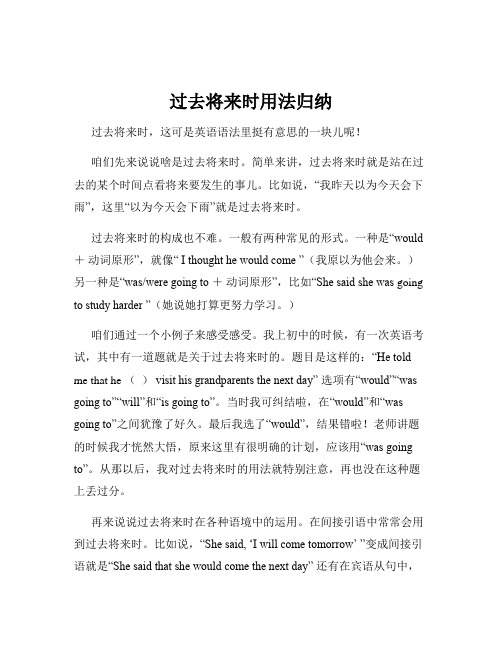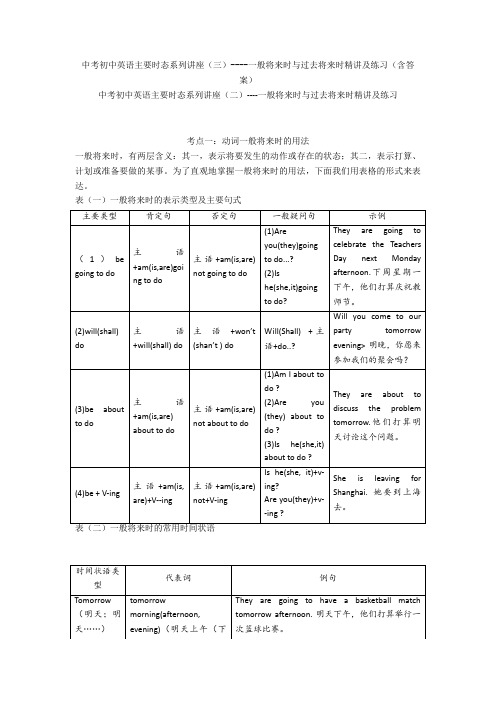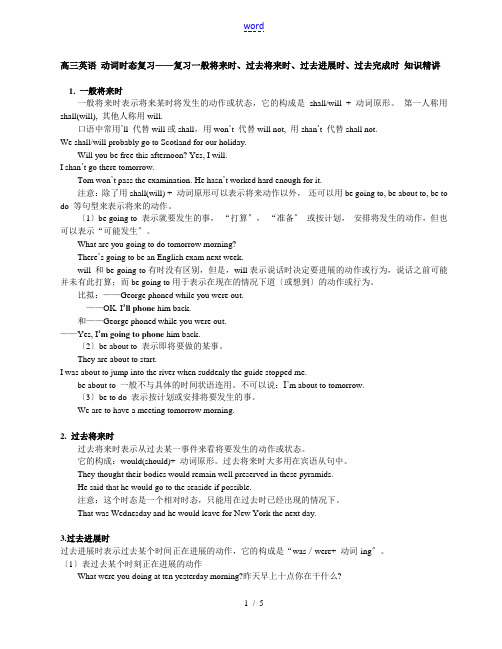过去将来时(精)
九年级英语重要知识点过去将来时

九年级英语重要知识点:过去未来时九年级英语重要知识点:过去未来时知识点总结过去未来时表示从过去的某一时间来看未来要发生的动作或存在的状态。
一、基本构成同一般未来时,把系动词 be 变为过去式,把 will , shall 变为过去式。
句型以下:必定句:主语 +be( was, were)going to+ 动词原形 +其他否定句:主语 +be( was, were)not going to+动词原形 +其他疑问句: Be(Was, Were)+主语 +going to+ 动词原形+其他必定句:主语 +would (should )+动词原形 +其他否定句:主语 +would( should )not+ 动词原形 + 其他疑问句: Would( Should ) +主语 +动词原形 +其他二、基本用法1、表示从过去的某一时间来看未来要发生的动作或存在的状态。
过去未来经常用于宾语从句和间接引语中。
例句: I didn't know if he would come.我不知道他可否会来。
(指过去不知道。
)She told us that she would not go with uained.她告诉我们,假以下雨,她就不和我们一起去了。
2、过去未来经常可用来表示过去习惯性的动作。
此时,无论什么人称,一律用 would.Whenever he had time,he would dading.他一有时间,总是看书。
3、表示主管打算、计划要做的事情或依照过去的某种迹象做出的推测,用was/were going to+动词原形表示 .例句: Last Sunday we were going to vGreat Wall, but it rained.上星期天我们本想去旅游长城的,但却下雨了。
常有考法对于过去未来时的观察,多以单项选择、词语运用的形式观察学生在详尽语境中灵便运用时态的能力。
在考试中,会让大家判断可否该用过去未来时,以及如何正确使用。
过去将来时用法归纳

过去将来时用法归纳过去将来时,这可是英语语法里挺有意思的一块儿呢!咱们先来说说啥是过去将来时。
简单来讲,过去将来时就是站在过去的某个时间点看将来要发生的事儿。
比如说,“我昨天以为今天会下雨”,这里“以为今天会下雨”就是过去将来时。
过去将来时的构成也不难。
一般有两种常见的形式。
一种是“would +动词原形”,就像“ I thought he would come ”(我原以为他会来。
)另一种是“was/were going to +动词原形”,比如“She said she was going to study harder ”(她说她打算更努力学习。
)咱们通过一个小例子来感受感受。
我上初中的时候,有一次英语考试,其中有一道题就是关于过去将来时的。
题目是这样的:“He told me that he ()visit his grandparents the next day” 选项有“would”“was going to”“will”和“is going to”。
当时我可纠结啦,在“would”和“was going to”之间犹豫了好久。
最后我选了“would”,结果错啦!老师讲题的时候我才恍然大悟,原来这里有很明确的计划,应该用“was going to”。
从那以后,我对过去将来时的用法就特别注意,再也没在这种题上丢过分。
再来说说过去将来时在各种语境中的运用。
在间接引语中常常会用到过去将来时。
比如说,“She said, ‘I will come tomorrow’ ”变成间接引语就是“She said that she would come the next day” 还有在宾语从句中,如果主句是过去时态,宾语从句中表示将来的动作就要用过去将来时。
像“He asked when she would leave”另外,过去将来时也能用来表达过去的愿望、打算或者预测。
比如说,“They hoped they would have a good time at the party”(他们希望在聚会上能玩得开心。
初中英语知识点过去将来时

初中英语知识点过去将来时过去将来时表示从过去的某一时间来看将来要发生的动作或存在的状态。
下面是小编为大家带来的初中英语知识点总结之过去将来时和过去进行时,希望能帮到大家!初中英语知识点总结:过去将来时一、基本构成同一般将来时,把系动词be变为过去式,把will,shall变为过去式。
句型如下:肯定句:主语+be(was,were)goingto+动词原形+其他否定句:主语+be(was,were)notgoingto+动词原形+其他疑问句:Be(Was,Were)+主语+goingto+动词原形+其他肯定句:主语+would(should)+动词原形+其他否定句:主语+would(should)not+动词原形+其他疑问句:Would(Should)+主语+动词原形+其他二、基本用法1、表示从过去的某一时间来看将来要发生的动作或存在的状态。
过去将来时常用于宾语从句和间接引语中。
例句:Ididn'tknowifhewouldcome.我不知道他是否会来。
(指过去不知道。
)Shetoldusthatshewouldnotgowithus,ifitrained.她告诉我们,如果下雨,她就不和我们一起去了。
2、过去将来时常可用来表示过去习惯性的动作。
此时,不管什么人称,一律用would。
Wheneverhehadtime,hewoulddosomereading.他一有时间,总是看书。
3、表示主管打算、计划要做的事情或根据过去的某种迹象做出的推测,用was/weregoingto+动词原形表示.例句:LastSundayweweregoingtovisittheGreatWall,butitrained.上星期天我们本想去游览长城的,但却下雨了。
初中英语知识点总结:过去进行时从字面上理解,过去进行时指“过去的某一时间进行发生的动作或事情”,这样的理解很正确!一、结构1.过去进行时由“主语+was/were+现在分词”构成例如:Wewerehavingsupperwhenthephonerang.我们正在吃晚饭时电话响了。
通过高考题精讲 过去将来时

通过高考题精讲过去将来时过去将来时已过去为起点,向现在发展,但不到现在,过去将要发生的动作。
常见于主句是一般过去时宾语从句中。
还可以在虚拟语气中运用。
常用would/should + do或者变体:was/were going to was/were to was/were about to过去的动作过去将来现在(2011上海)34.Did you predict that many students ______ up for the dance competition?A. would signB. signedC. have signedD. had signed解析:本题选择A.根据主句用的一般过去时和predict,所以sign应该用过去将来时。
20. Albert Einstein was born in 1879. As a child, few people guessed that he a famous scientist whose theories would change the world. (浙江卷)A. has beenB. had beenC. was going to beD. was解析:本题选择C.根据上文爱因斯坦小时候was born,a child, guessed宾语从句中著名科学家应该是后来的事情,而且定语从句也有提示whose theories would change the world。
(2009湖南) 23.When he the door, he found his keys were nowhere.A. would openB. openedC. had openedD. was to open解析:本题选择D.时间状语从句中,A要用一般过去时代替过去将来时;B项说明已打开门,与下文矛盾;C项说明正准备开门,表将来,但主句发现钥匙找不到了。
中考英语备考:初中英语主要时态系列讲座(三)----一般将来时与过去将来时精讲及练习(含答

中考初中英语主要时态系列讲座(三)----一般将来时与过去将来时精讲及练习(含答案)中考初中英语主要时态系列讲座(二)----一般将来时与过去将来时精讲及练习考点一:动词一般将来时的用法一般将来时,有两层含义:其一,表示将要发生的动作或存在的状态;其二,表示打算、计划或准备要做的某事。
为了直观地掌握一般将来时的用法,下面我们用表格的形式来表达。
表(一)一般将来时的表示类型及主要句式表(三)一般将来时的主要用法(天津)---What is your plan for next weekend,Lingling?----I volunteer work in the museum.A. was doingB. didC. have doneD. am going to do【析】正确答案D。
句意是:玲玲,下周末的安排是什么?我打算到博物馆去作志愿者。
根据上文的next weekend(下周末)可知,玲玲的回答是指下周的打算,所以用一般将来时,因此,正确答案为D。
【典型考例】(四川内江)---Have you watched the new movie,Joe?---No,I________ it with my sister this evening.A.watch B.are watching C.watched D.will watch【析】正确答案:D。
句意是:乔,你看了这部新电影吗?没有。
我今晚将和我妹妹一起去看。
根据本句末的时间状语this evening可知,看新电影这动作是将来要做的事情,因此动词使用一般将来时。
所以,正确答案为D。
【典型考例】(天津)----Could you tell me for the fruit?----By paying over the Internet.A. how much will I payB. how much I will payC. how will I payD. how I will pay【析】正确答案D。
高三英语 动词时态复习——复习一般将来时、过去将来时、过去进行时、过去完成时 知识精讲

高三英语动词时态复习——复习一般将来时、过去将来时、过去进展时、过去完成时知识精讲1. 一般将来时一般将来时表示将来某时将发生的动作或状态,它的构成是shall/will + 动词原形。
第一人称用shall(will), 其他人称用will.口语中常用’ll 代替will或shall,用won’t 代替will not, 用shan’t 代替shall not.We shall/will probably go to Scotland for our holiday.Will you be free this afternoon? Yes, I will.I shan’t go there tomorrow.Tom won’t pass the examination. He hasn’t worked hard enough for it.注意:除了用shall(will) + 动词原形可以表示将来动作以外,还可以用be going to, be about to, be to do 等句型来表示将来的动作。
〔1〕be going to 表示就要发生的事,“打算〞,“准备〞或按计划,安排将发生的动作,但也可以表示“可能发生〞。
What are you going to do tomorrow morning?There’s going to be an English exam next week.will 和be going to有时没有区别,但是,will表示说话时决定要进展的动作或行为,说话之前可能并未有此打算;而be going to用于表示在现在的情况下道〔或想到〕的动作或行为。
比拟:——George phoned while you were out.——OK. I’ll phone him back.和——George phoned while you were out.——Yes, I’m going to phone him back.〔2〕be about to 表示即将要做的某事。
过去将来时——精选推荐

过去将来时过去将来时1过去将来时的定义主要表达在过去某仪点时间看将来可能会发⽣的事情. ⼀般过去将来时的出发点是过去,即从过去某⼀时刻看以后要发⽣的动作或状态。
过去将来时的时间状语:1) at six the next morning, at two the next afternoon, at eight the next night, the next day, the next Friday, the next week, the next month, the next year2)the following day, the following week,the following month, the following year3)two days later, three weeks later, four years later4) after 10 o'clock, after 10 o'clock in the morning, after 9 o'clock5)when, after引导的时间状语从句。
2过去将来时的构成及基本句型过去将来时构成:和⼀般将来时⼀样,只不过把助动词be变为过去式,把will,shall 变为过去式。
⼀般过去将来时是由"should / would + 动词原形"构成的。
(⼀般过去将来时常⽤于间接引语中)过去将来时的基本句型,肯定句:be(was,were)going toShe said she was going to start off at once.她说她将⽴即出发。
否定句:be(was,were)not going to在be动词后直接加not,She said she was not going to start off at once.她说她不会⽴即出发。
疑问句:Be(Was,Were)+主语+going to+动词原形+其它把be动词提前到句⾸。
初中英语知识点-【过去将来时】

过去将来时目录过去将来时的标志词 (1)过去将来时易错点 (1)过去将来时常见考法 (2)过去将来时用法 (2)过去将来时句型 (2)过去将来时的基本表示形式 (2)—过去将来时的句中表示形式 (3)过去将来时的标志词一、"would+动词原形"表示过去将来时"would+动词原形"构成过去将来时,常表示根据计划或安排即将发生的事。
例1:He said he would come to see me.他说他要来看我。
例2:He told me he would go to Beijing.他告诉我他将去北京。
】二、"was /were+going to+动词原形"表示过去将来时"was /were+going to+动词原形"也可表示根据计划或安排即将发生的事。
例1:She said she was going to start at once.她说她将立即出发。
例2:I was told that he was going to return home.有人告诉我他准备回家。
"was /were+going to+动词原形"还可表示根据当时情况判断有可能但不一定会发生某事。
例:It seemed as if it was going to rain.看来好像要下雨。
三、某些动词的过去进行时可表示过去将来时come,go,leave,arrive,start等严格按照时间表发生的表起止的动词可用过去进行时代替过去将来时。
!例1:He said the train was leaving at six the next morning.他说火车第二天早晨出发。
例2:She told me she was coming to see me.她告诉我她要来看我。
四、特定场合的一般过去时可表示过去将来时条件状语从句和时间状语从句中须用一般过去时代替过去将来时。
- 1、下载文档前请自行甄别文档内容的完整性,平台不提供额外的编辑、内容补充、找答案等附加服务。
- 2、"仅部分预览"的文档,不可在线预览部分如存在完整性等问题,可反馈申请退款(可完整预览的文档不适用该条件!)。
- 3、如文档侵犯您的权益,请联系客服反馈,我们会尽快为您处理(人工客服工作时间:9:00-18:30)。
用所给动词的适当形式填空: 1. They were sure they __________________ (finish) the would finish work on time. 2. I said I ____________________________________(buy) would buy/should buy/was going to buy my pop from someone else later. 3. He wondered what his parents would _____________________ do/were going to do (do) next. 4. She told us she _________________(go) with us if it was would go/was going fine. 5. He said there _______________________(be) a meeting would be/was going to be that afternoon. 6. I didn’t know if he ______________________________ would come/was going to come ____________ /was coming (come) the next week. 7. I told him I _____________________________________ would meet/was going to meet/had met (meet) him at the station.
二、填空 was leaving 1 She said the bus _____________(leave) at five the next morning. lend 2 I wasn't sure whether he would _________(lend) me his book the next morning. 3 He was fifty-six. In two years he would be _________(be)fifty-eight. 4 Whenever she had time, would help she ___________(help) them in their work.
过去将来时
Past Fut过去某时
看将来要发生的动作或存在 的状态.
谓语结构
would/should +v
was/were going to +v" 过去将来时常用在主句为
用法
过去时的宾语从句中,从 句表示将要发生的事情.
1.结构“would/should +v”.
2结构.was/were going to +v“
表示过去打算或准备要做的事
He said that he was going to have a walk with his mother.
注意:go , come, leave, start 等是趋向动词, 常用过去进行时表示一个当时按计划或安排近 期将要发生的事情。 .E.g. He didn't say when he was coming.
1- The plane is leaving right now, but Jim hasn't arrived yet. - Well, he said he _____here on time.
A came B would come C can be D will be
4Jenny said she _____her holiday in China.
请你观察过去将来时态的用法:
过去将来时常用于宾语从句中
We didn’t know whether they were going to give
us a talk this afternoon.
I didn’t know when he would leave for Shanghai.
一、单选
A spent B would spent C was going to spent D would spend
2 As soon as the baby saw her mother, she _____.
A was going to cry B cryed C began to cry D was crying
选择最佳答案: 1. She said she _______ a meeting the next day. A. had B. was having C. will have D. was going to have 2. They were sure they ______ the football match. A. won B. was winning C. win D. would win 3. They _______ a football match when I saw them. A. had B. would have C. are having D. were having 4. We asked him where he _______ the next week. A. would go B. went C. is going D. were going 5. We ______ the Science Museum next week. A. would visit D.is going to visit C. is visiting B. will visit 6. He said he _________ his homework already. A. would finish B. was going to finish C. finished D. had finished
should用于第一人称 would用于所有人称
I hoped I should be well again very soon. 我希望我将很快就又好起来。 My mother told me she would go shopping 妈妈告诉我她将去购物。
过去将来时常用在主句为过去时的宾语从句中,从 句表示将要发生的事情.
√ √
√
√
√
